英语委婉语广泛运用论文
写一篇作用到委婉语的英语作文
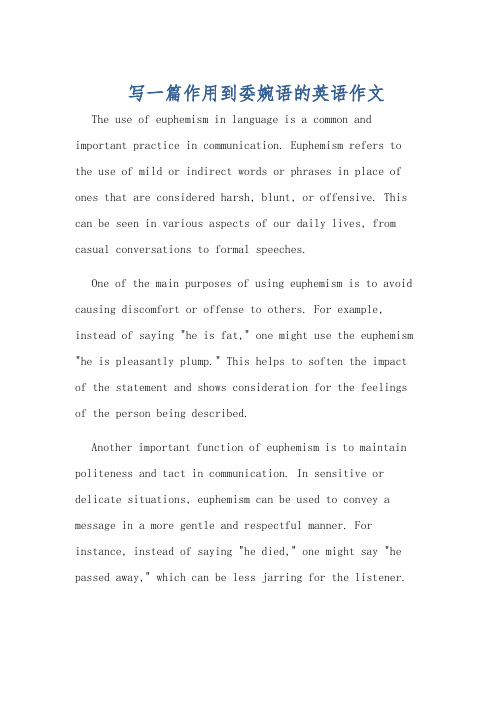
写一篇作用到委婉语的英语作文The use of euphemism in language is a common and important practice in communication. Euphemism refers to the use of mild or indirect words or phrases in place of ones that are considered harsh, blunt, or offensive. This can be seen in various aspects of our daily lives, from casual conversations to formal speeches.One of the main purposes of using euphemism is to avoid causing discomfort or offense to others. For example, instead of saying "he is fat," one might use the euphemism "he is pleasantly plump." This helps to soften the impact of the statement and shows consideration for the feelings of the person being described.Another important function of euphemism is to maintain politeness and tact in communication. In sensitive or delicate situations, euphemism can be used to convey a message in a more gentle and respectful manner. For instance, instead of saying "he died," one might say "he passed away," which can be less jarring for the listener.Additionally, euphemism can be used to conveyinformation in a more socially acceptable way. For example, instead of discussing intimate bodily functions in a direct manner, euphemisms can be used to address these topics more delicately.Furthermore, euphemism can also be used as a tool for diplomacy and to avoid confrontation. By choosing words carefully and using euphemistic language, individuals can navigate potentially contentious situations with greater finesse and diplomacy.Overall, the use of euphemism in language serves tofoster harmony, respect, and consideration in communication. It allows individuals to convey messages in a more gentle and tactful manner, and to navigate sensitive topics with greater sensitivity and diplomacy.使用委婉语在语言中是一种常见且重要的交流方式。
浅谈英语委婉语的特点及应用英语论文论文
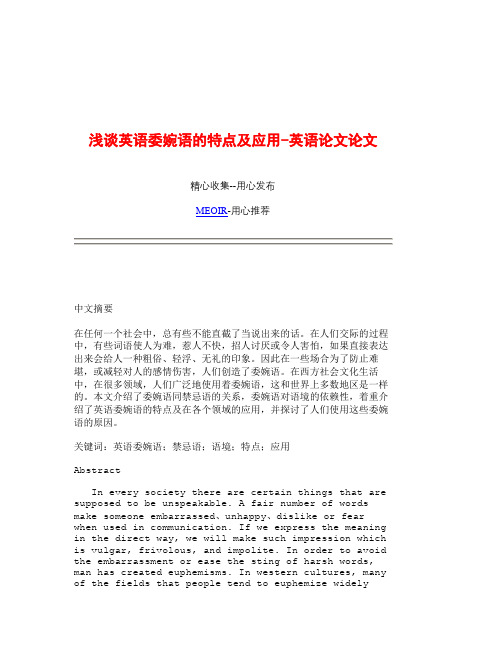
are not different from anywhere in the world. This paper introduces the relationship between euphemism and taboo and the dependence on the context. Itmainly focuses on the characteristics and the application of English euphemism, and the causes of using euphemism.Key words: English euphemism; taboo; context; characteristics; applicationI一.引言委婉语是人类社会中普遍存在的一种语言现象,是用语言来调剂人际关系的一个重要手段。
它是一种修辞格,更是一种文化现象。
由于委婉语具有较强的说服力,拥有很好的修饰效果,所以普及生活中的各个层次,各个角落,倍受人们喜爱。
英语委婉语也已成为英语文化中不可割舍的一局部,是英语最重要的组成局部之一,也是跨文化交际里一个重要的课题。
?新编英语教程?第四册Unit 2 Text IB 有这样一幅漫画,描述了这样一那么幽默:一位来自法国巴黎的客人旅居英国伦敦,女房东介绍到: “Here’s grandma.〞那位老奶奶说到: “ My husband has just passed to the other side.〞客人往花园栅栏的另一边望去,并没有看见人影,感到很奇怪.女房东又解释了一遍: “I mean granddad’s kicked the bucket.〞客人就抚慰老奶奶: “I hope his foot will be better soon.〞老奶奶莫名其妙.女房东进一步解释到:“ No, he’s not here. He’s snuffed it …you know!〞客人更是摸不到头脑,脱口而出:“But you’ve got electricity here.〞那位巴黎的客人之所以做出这种风马牛不相及的答复,是因为他没有意识到女房东使用了委婉语,没有理解到委婉语的“会话含义〞,而房东真正要表达的意思是“爷爷去世了。
论英语中委婉语的应用
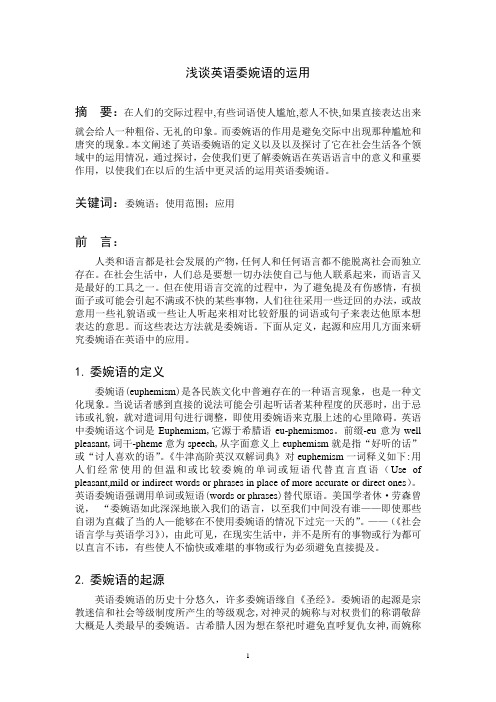
浅谈英语委婉语的运用摘要:在人们的交际过程中,有些词语使人尴尬,惹人不快,如果直接表达出来就会给人一种粗俗、无礼的印象。
而委婉语的作用是避免交际中出现那种尴尬和唐突的现象。
本文阐述了英语委婉语的定义以及以及探讨了它在社会生活各个领域中的运用情况,通过探讨,会使我们更了解委婉语在英语语言中的意义和重要作用,以使我们在以后的生活中更灵活的运用英语委婉语。
关键词:委婉语;使用范围;应用前言:人类和语言都是社会发展的产物,任何人和任何语言都不能脱离社会而独立存在。
在社会生活中,人们总是要想一切办法使自己与他人联系起来,而语言又是最好的工具之一。
但在使用语言交流的过程中,为了避免提及有伤感情,有损面子或可能会引起不满或不快的某些事物,人们往往采用一些迂回的办法,或故意用一些礼貌语或一些让人听起来相对比较舒服的词语或句子来表达他原本想表达的意思。
而这些表达方法就是委婉语。
下面从定义,起源和应用几方面来研究委婉语在英语中的应用。
1.委婉语的定义委婉语(euphemism)是各民族文化中普遍存在的一种语言现象,也是一种文化现象。
当说话者感到直接的说法可能会引起听话者某种程度的厌恶时,出于忌讳或礼貌,就对遣词用句进行调整,即使用委婉语来克服上述的心里障碍。
英语中委婉语这个词是Euphemism,它源于希腊语eu-phemismos。
前缀-eu意为well pleasant,词干-pheme意为speech,从字面意义上euphemism就是指“好听的话”或“讨人喜欢的语”。
《牛津高阶英汉双解词典》对euphemism一词释义如下:用人们经常使用的但温和或比较委婉的单词或短语代替直言直语(Use of pleasant,mild or indirect words or phrases in place of more accurate or direct ones)。
英语委婉语强调用单词或短语(words or phrases)替代原语。
英语委婉语论文
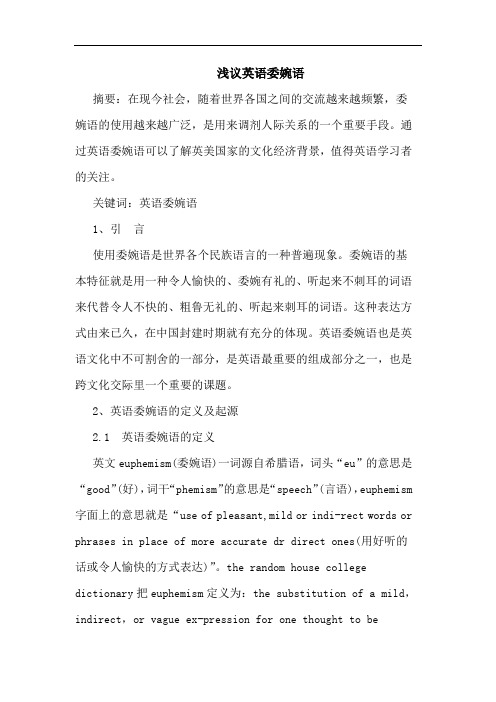
浅议英语委婉语摘要:在现今社会,随着世界各国之间的交流越来越频繁,委婉语的使用越来越广泛,是用来调剂人际关系的一个重要手段。
通过英语委婉语可以了解英美国家的文化经济背景,值得英语学习者的关注。
关键词:英语委婉语1、引言使用委婉语是世界各个民族语言的一种普遍现象。
委婉语的基本特征就是用一种令人愉快的、委婉有礼的、听起来不刺耳的词语来代替令人不快的、粗鲁无礼的、听起来刺耳的词语。
这种表达方式由来已久,在中国封建时期就有充分的体现。
英语委婉语也是英语文化中不可割舍的一部分,是英语最重要的组成部分之一,也是跨文化交际里一个重要的课题。
2、英语委婉语的定义及起源2.1 英语委婉语的定义英文euphemism(委婉语)一词源自希腊语,词头“eu”的意思是“good”(好),词干“phemism”的意思是“speech”(言语),euphemism 字面上的意思就是“use of pleasant,mild or indi-rect words or phrases in place of more accurate dr direct ones(用好听的话或令人愉快的方式表达)”。
the random house college dictionary把euphemism定义为:the substitution of a mild,indirect,or vague ex-pression for one thought to beoffensive,harsh or blunt,其意就是“用一种令人愉快的,委婉有礼的,听起来顺耳的词语来取代令人不快的、粗鲁无礼的、听起来刺耳的词语”。
美国著名作家门肯(h.l.meneken)称委婉语为gilded words(镀金词),而斯蒂芬·坎费尔(stefan kanfer)把它说成cosmetic words(化妆词),他们无疑都对委婉语的含义和作用做了确切的描述。
英语委婉语的应用论文
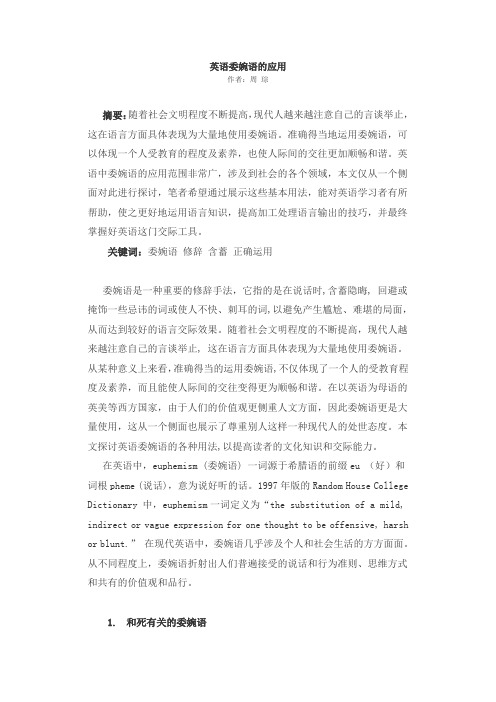
英语委婉语的应用作者:周琮摘要:随着社会文明程度不断提高,现代人越来越注意自己的言谈举止,这在语言方面具体表现为大量地使用委婉语。
准确得当地运用委婉语,可以体现一个人受教育的程度及素养,也使人际间的交往更加顺畅和谐。
英语中委婉语的应用范围非常广,涉及到社会的各个领域,本文仅从一个侧面对此进行探讨,笔者希望通过展示这些基本用法,能对英语学习者有所帮助,使之更好地运用语言知识,提高加工处理语言输出的技巧,并最终掌握好英语这门交际工具。
关键词:委婉语修辞含蓄正确运用委婉语是一种重要的修辞手法,它指的是在说话时,含蓄隐晦, 回避或掩饰一些忌讳的词或使人不快、刺耳的词,以避免产生尴尬、难堪的局面,从而达到较好的语言交际效果。
随着社会文明程度的不断提高,现代人越来越注意自己的言谈举止, 这在语言方面具体表现为大量地使用委婉语。
从某种意义上来看,准确得当的运用委婉语,不仅体现了一个人的受教育程度及素养,而且能使人际间的交往变得更为顺畅和谐。
在以英语为母语的英美等西方国家,由于人们的价值观更侧重人文方面,因此委婉语更是大量使用,这从一个侧面也展示了尊重别人这样一种现代人的处世态度。
本文探讨英语委婉语的各种用法,以提高读者的文化知识和交际能力。
在英语中,euphemism (委婉语) 一词源于希腊语的前缀eu (好)和词根pheme (说话),意为说好听的话。
1997年版的Random House College Dictionary 中,euphemism一词定义为“the substitution of a mild, indirect or vague expression for one thought to be offensive, harsh or blunt.”在现代英语中,委婉语几乎涉及个人和社会生活的方方面面。
从不同程度上,委婉语折射出人们普遍接受的说话和行为准则、思维方式和共有的价值观和品行。
使用委婉语的作文英语
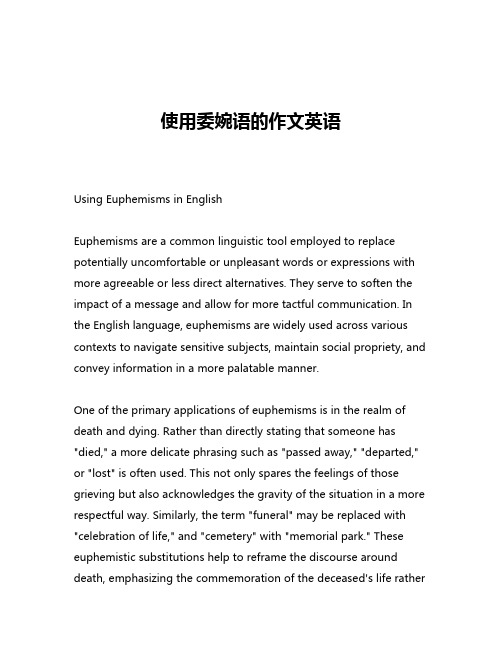
使用委婉语的作文英语Using Euphemisms in EnglishEuphemisms are a common linguistic tool employed to replace potentially uncomfortable or unpleasant words or expressions with more agreeable or less direct alternatives. They serve to soften the impact of a message and allow for more tactful communication. In the English language, euphemisms are widely used across various contexts to navigate sensitive subjects, maintain social propriety, and convey information in a more palatable manner.One of the primary applications of euphemisms is in the realm of death and dying. Rather than directly stating that someone has "died," a more delicate phrasing such as "passed away," "departed," or "lost" is often used. This not only spares the feelings of those grieving but also acknowledges the gravity of the situation in a more respectful way. Similarly, the term "funeral" may be replaced with "celebration of life," and "cemetery" with "memorial park." These euphemistic substitutions help to reframe the discourse around death, emphasizing the commemoration of the deceased's life ratherthan the finality of their passing.Another domain where euphemisms are extensively employed is that of bodily functions and personal hygiene. Terms like "restroom," "lavatory," or "powder room" are used in place of the more direct "bathroom" or "toilet." Expressions such as "going to the littlegirls'/boys' room" or "taking a break" further obscure the true nature of the activity. Euphemisms are also common when discussing menstruation, with phrases like "on the rag," "that time of the month," or "having a visit from Aunt Flo" being used to avoid the direct mention of a biological process.In the realm of interpersonal relationships and sexuality, euphemisms abound. "Making love" is a more delicate way of referring to sexual intercourse, while "intimate relations" or "being intimate" can denote a wide range of physical and emotional intimacy. Euphemisms are also used to discuss pregnancy, with expressions like "with child," "in a family way," or "expecting" being preferred over the more clinical "pregnant." Additionally, terms like "call girl," "escort," or "companion" are used to refer to sex workers, rather than the more blunt "prostitute."The workplace and professional settings also see the frequent use of euphemisms. Employees who have been terminated from their jobs are often said to have been "let go," "released," or "separated fromthe company," rather than being "fired" or "dismissed." Similarly, the term "downsizing" is used to describe the process of reducing the workforce, which has a less harsh connotation than "layoffs" or "redundancies." Euphemisms are also employed when discussing poor job performance, with phrases like "underperforming," "needing improvement," or "not meeting expectations" being preferred over more direct criticisms.In the realm of politics and public discourse, euphemisms are employed to obfuscate or soften the impact of certain actions or policies. For instance, the term "enhanced interrogation techniques" is used as a euphemism for torture, while "collateral damage" refers to the unintended deaths of civilians during military operations. Additionally, the phrase "alternative facts" has been used to euphemistically describe false or misleading information, rather than acknowledging them as lies or misinformation.Euphemisms can also serve to maintain social norms and avoid causing offense. Terms like "differently abled" or "physically challenged" are used in place of "disabled" or "handicapped," and "senior citizen" or "mature adult" replace the more blunt "old person." Similarly, "economically disadvantaged" is preferred over "poor," and "undocumented immigrant" is used instead of "illegal alien."While the use of euphemisms can be seen as a way to navigate sensitive topics with greater tact and diplomacy, it is important to recognize that they can also be used to obscure the truth, downplay the severity of a situation, or perpetuate societal biases. Excessive reliance on euphemisms can sometimes lead to a disconnect between language and reality, potentially hindering open and honest discourse.In conclusion, the use of euphemisms in the English language is a widespread and multifaceted phenomenon. They serve to soften the impact of potentially uncomfortable or unpleasant subjects, maintain social propriety, and convey information in a more palatable manner. However, it is crucial to be mindful of the potential pitfalls of euphemistic language and strive for a balance between sensitivity and transparency in communication.。
大学英语专业毕业论文【浅析委婉语的语用功能,以美剧《绝望主妇》为例 】

Ⅰ.IntroductionEnglish euphemism is a common phenomenon in the development of human society in language use. It exists in different backgrounds of culture and in different social level.In the 18th and 19th centuries, euphemism got a rapid development in the UK. A long time ago, some western scholars conducted researches on Euphemism. In 1936, Menken wrote The American Language, which studied the production and development of euphemism in American. Chinese scholars have also published many papers on English Euphemism, for example, Liu Chun, the editor of the knowledge dictionary Dictionary of English Euphemisms. This is a dictionary which contains the detailed introduction to English euphemism and collects more than 8000 Euphemism in total. Based on their achievements, we will have an exploration of English euphemisms from the pragmatic perspective. The goal of this paper is to show the pragmatic function of English euphemism, assisting English learners to improve language skills and enhance the ability of processing language output so as to finally master this communication tool. English euphemism has become one of the major ways to convey meaning and intention for human beings in their daily communication, so it is crucial for us to make some research on English euphemism.Ⅱ.English EuphemismEuphemism is a common linguistic phenomenon. It’s a more polite way when unpleasant or embarrassing things are talked about. It is a figure of speech, but also a cultural phenomenon. Understanding some basic knowledge of euphemism has a great meaning for us English learner.2.1 The Definition of English EuphemismEuphemism is an important rhetorical device, which means that in the talk, people use veiled and obscure words, hiding some taboo words or unpleasant, harsh words. The speaker wants to avoid the awkward and embarrassing situation and to achieve a better communicative effect, therefore Euphemism is employed. With the development of social civilization, modern people pay more and more attention to their own speech and deportment. This can be reflected in the use of euphemism. Euphemism comes from the Greek. The prefix Eu means good and the root means speak, so “euphemism”means to say nice words. The Random House College Dictionary (1979) defines euphemism as: the substitution of a mild, indirect, or vague expression for one thought to be offensive, harsh or blunt, its meaning is "a pleasant, tactful and courteous, sweet words to replace unpleasant, rude the harsh words, sounds".2.2 The Origination of English EuphemismEnglish euphemism originated from religious taboo. In the early stage of human civilization with low productivity, poor living conditions, people could not understand and master the nature, so they had the worship and feared a kind of supernatural powers and superstition, people believed the nature of religion. The language is endowed with certain strength. People think that the language itself can bring happiness or disaster to the people, thus they create "euphemism" to replace ghosts and taboos on death.2.3 The Classification of English EuphemismThere are myriads of changes in expressions of euphemism. This section mainly gives a simple classification from the semantic aspect, which can be divided into the traditional euphemism and stylistic euphemism according to.2.3.1 Traditional EuphemismTraditional euphemism is also known as negative euphemisms, which is related with taboos closely. Take the commonly used word “死” for instance. It will have thefollowing expressions: “expire(逝世),pass away(与世长辞),pay the debt of nature (了结尘缘),close one’s day(寿终),breathe one’s last(断气),go west(归西天),give up the ghost(见阎王),kick the bucket(翘辫子)and so on.”“解手,上厕所”(bathroom)has a variety of euphemistic expressions, such as : be caught short to,call of nature,do ones duty to,go some-where to,go to the bathroom,to see John.2.3.2 Stylistic EuphemismStylistic euphemism is also called positive Euphemisms (hyperbole euphemism). It means praising words and compliment. In interpersonal communication, in order to show politeness or avoid some possible unpleasantness, the speaker sometimes uses some exaggerating praise to replace what they want to express.The word ‘c ollar’means ‘the top part of the clothes’. In modern society, according to the different work classes, it can be divided into blue collar ( 蓝领, manual workers), white collar (白领, white-collar worker).With the refinement of social division of labor, there are other occupations. The salary and social status between the white collar and blue collar is called gray collar (refers to the repair and maintenance workers in the industry). The professional that are higher than white-collar is called gold collar (金领). And bright collar (亮领) is used to describe a female pink collar (粉领) and computer communication professionals.Ⅲ. The Pragmatic Functions of English Euphemism3.1 The Taboo Function.Firstly, we will discuss fertility and sexual taboo. Usually people don't mention fertility directly, but politely say “to come into the world”( 来到人世),while “pregnant”(怀孕) is called “anticipating or excepting” (期待的),and “eating for tow” (吃两份饭),because a woman ’s pregnancy has an inevitable connection with sex. People also use “nature child”, “baby of love” to refer to the illegitimate child. Secondly, it is about the taboo of age. In the traditional idea in the west, the old menare as veterans, who are not in the mainstream of society any more, so people rarely talk about age in front of them. People sometimes refer to the old age as golden age, the elderly (老年人) as senior citizens (资深公民. Thirdly, it is about the taboo of the disease. Such as “ the venereal disease” (性病) is called “social disease”(社会疾病),and AIDS (艾滋病) will be known as the communicable social disease (可传染的社会疾病)。
英语委婉语广泛运用论文
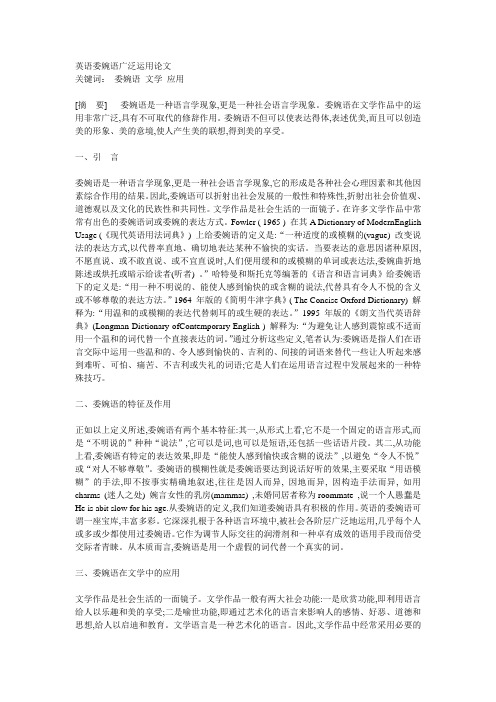
英语委婉语广泛运用论文关键词:委婉语文学应用[摘要] 委婉语是一种语言学现象,更是一种社会语言学现象。
委婉语在文学作品中的运用非常广泛,具有不可取代的修辞作用。
委婉语不但可以使表达得体,表述优美,而且可以创造美的形象、美的意境,使人产生美的联想,得到美的享受。
一、引言委婉语是一种语言学现象,更是一种社会语言学现象,它的形成是各种社会心理因素和其他因素综合作用的结果。
因此,委婉语可以折射出社会发展的一般性和特殊性,折射出社会价值观、道德观以及文化的民族性和共同性。
文学作品是社会生活的一面镜子。
在许多文学作品中常常有出色的委婉语词或委婉的表达方式。
Fowler ( 1965 ) 在其A Dictionary of ModernEnglish Usage (《现代英语用法词典》) 上给委婉语的定义是:“一种适度的或模糊的(vague) 改变说法的表达方式,以代替率直地、确切地表达某种不愉快的实话。
当要表达的意思因诸种原因,不愿直说、或不敢直说、或不宜直说时,人们便用缓和的或模糊的单词或表达法,委婉曲折地陈述或烘托或暗示给读者(听者) 。
”哈特曼和斯托克等编著的《语言和语言词典》给委婉语下的定义是:“用一种不明说的、能使人感到愉快的或含糊的说法,代替具有令人不悦的含义或不够尊敬的表达方法。
”1964 年版的《简明牛津字典》( The Concise Oxford Dictionary) 解释为:“用温和的或模糊的表达代替刺耳的或生硬的表达。
”1995 年版的《朗文当代英语辞典》(Longman Dictionary ofContemporary English ) 解释为:“为避免让人感到震惊或不适而用一个温和的词代替一个直接表达的词。
”通过分析这些定义,笔者认为:委婉语是指人们在语言交际中运用一些温和的、令人感到愉快的、吉利的、间接的词语来替代一些让人听起来感到难听、可怕、痛苦、不吉利或失礼的词语;它是人们在运用语言过程中发展起来的一种特殊技巧。
- 1、下载文档前请自行甄别文档内容的完整性,平台不提供额外的编辑、内容补充、找答案等附加服务。
- 2、"仅部分预览"的文档,不可在线预览部分如存在完整性等问题,可反馈申请退款(可完整预览的文档不适用该条件!)。
- 3、如文档侵犯您的权益,请联系客服反馈,我们会尽快为您处理(人工客服工作时间:9:00-18:30)。
英语委婉语广泛运用论文关键词:委婉语文学应用[摘要] 委婉语是一种语言学现象,更是一种社会语言学现象。
委婉语在文学作品中的运用非常广泛,具有不可取代的修辞作用。
委婉语不但可以使表达得体,表述优美,而且可以创造美的形象、美的意境,使人产生美的联想,得到美的享受。
一、引言委婉语是一种语言学现象,更是一种社会语言学现象,它的形成是各种社会心理因素和其他因素综合作用的结果。
因此,委婉语可以折射出社会发展的一般性和特殊性,折射出社会价值观、道德观以及文化的民族性和共同性。
文学作品是社会生活的一面镜子。
在许多文学作品中常常有出色的委婉语词或委婉的表达方式。
Fowler ( 1965 ) 在其A Dictionary of ModernEnglish Usage (《现代英语用法词典》) 上给委婉语的定义是:“一种适度的或模糊的(vague) 改变说法的表达方式,以代替率直地、确切地表达某种不愉快的实话。
当要表达的意思因诸种原因,不愿直说、或不敢直说、或不宜直说时,人们便用缓和的或模糊的单词或表达法,委婉曲折地陈述或烘托或暗示给读者(听者) 。
”哈特曼和斯托克等编著的《语言和语言词典》给委婉语下的定义是:“用一种不明说的、能使人感到愉快的或含糊的说法,代替具有令人不悦的含义或不够尊敬的表达方法。
”1964 年版的《简明牛津字典》( The Concise Oxford Dictionary) 解释为:“用温和的或模糊的表达代替刺耳的或生硬的表达。
”1995 年版的《朗文当代英语辞典》(Longman Dictionary ofContemporary English ) 解释为:“为避免让人感到震惊或不适而用一个温和的词代替一个直接表达的词。
”通过分析这些定义,笔者认为:委婉语是指人们在语言交际中运用一些温和的、令人感到愉快的、吉利的、间接的词语来替代一些让人听起来感到难听、可怕、痛苦、不吉利或失礼的词语;它是人们在运用语言过程中发展起来的一种特殊技巧。
二、委婉语的特征及作用正如以上定义所述,委婉语有两个基本特征:其一,从形式上看,它不是一个固定的语言形式,而是“不明说的”种种“说法”,它可以是词,也可以是短语,还包括一些话语片段。
其二,从功能上看,委婉语有特定的表达效果,即是“能使人感到愉快或含糊的说法”,以避免“令人不悦”或“对人不够尊敬”。
委婉语的模糊性就是委婉语要达到说话好听的效果,主要采取“用语模糊”的手法,即不按事实精确地叙述,往往是因人而异, 因地而异, 因构造手法而异, 如用charms (迷人之处) 婉言女性的乳房(mammas) ,未婚同居者称为roommate ,说一个人愚蠢是He is abit slow for his age.从委婉语的定义,我们知道委婉语具有积极的作用。
英语的委婉语可谓一座宝库,丰富多彩。
它深深扎根于各种语言环境中,被社会各阶层广泛地运用,几乎每个人或多或少都使用过委婉语。
它作为调节人际交往的润滑剂和一种卓有成效的语用手段而倍受交际者青睐。
从本质而言,委婉语是用一个虚假的词代替一个真实的词。
三、委婉语在文学中的应用文学作品是社会生活的一面镜子。
文学作品一般有两大社会功能:一是欣赏功能,即利用语言给人以乐趣和美的享受;二是喻世功能,即通过艺术化的语言来影响人的感情、好恶、道德和思想,给人以启迪和教育。
文学语言是一种艺术化的语言。
因此,文学作品中经常采用必要的方式来达到语言的艺术化,实现以上两大功能。
许多文学作品中常常有出色的委婉语词或委婉的表达方式。
在一些文学作品中,不乏根据人物性格特点、生活经历等创造出来的恰如其分的委婉语,其委婉的说法大胆新奇,带来意想不到的语言与文化文体效果。
读者在阅读时可感受到其中极高的美学价值和长久的艺术生命力,其人物性格通过这一委婉语的使用,跃然纸上,令人回味无穷。
1. 死亡“死”(deat h) 这个词无论在什么样的文化当中都是令人忌讳的。
在很多情况下,人们总是寻找一些中性的或具有积极意义的词汇来形容它。
“死亡”委婉语经常出现在文学作品里。
例如:(1) Thus was I , sleeping , by a brot her’s life , of crown , of queen , at once dis2patch’d ;Cut off even in t he blossoms of my sin ,Unhous’led , disappointed , unanel’d ;No reck ’ning made , but sent to my ac2count .With all my imperfection on my head.(W. Shakespeare , Hamlet)(2) Thou lies t i n Abra ham’s bosom all t he year .(W. Wordswort h , Miscellaneous Sonnet s)(3) Is it not sufficient for you infernal selfish2ness , t hat while you a re at peace I shall writhe int he torment s of hell ? ( E. Bronte , Wut heringHeight s)(4) The pinched and meager aspect of the placewould have killed a chameleon ; he would haveknown , at the fir st mout hf ul , that t he air was noteatable , and mus t have given up t he ghos t in de2spair . (C. Dickens , The Old Curiosity Shop)(5)“People can’t die , along t he coast ”, saidMr . Peggot ty ,“except when t he tide’s pret ty nighout can’t be bom , unless it’s pret ty nigh in - notproperly born , till flood. He’s a goi ng out wit h t heti de ; it’s ebb at half af ter t hree , slack water half anhour . If he lives till it t urns , he’ll hold his ownpast t he flood , and go out wit h t he next ti de. ”(Charles Dickens , David Corperfield)例(1) 中的sent to my account ,例(2) 中的liestin Abraham’s bosom ,例(3) 中的are at peace ,例(4)中的must have given up the ghost ,例(5) 中的go(out) wit h t he next tide ,这些都是“死”的委婉语,其中例(5) 中的委婉语充分表现了渔民的生活环境、独特性格、生活方式乃至于生命从开始到终结的大海情结。
在莎士比亚《哈姆雷特》中有这样一段话:“Forin that sleep of deat h what dreams may come , whenwe have shuffled off t his moral coil . ”这里死亡被比做“摆脱尘世的羁绊”。
马克吐温(Mark Twain) 在《汤姆索亚历险记》( The advent ure of Tom Sawyer )中也曾用release (解脱) 来表示“死亡”: It seemed tohim t hat life was but a t rouble ; at best , and hemore t han half envied J immy Hodges , so lately re2leased. 用“release”来表示死亡,表达了人生多烦恼、解脱了凡尘的人物内心世界。
作家巧妙运用委婉语增添作品的魅力,我们在阅读、欣赏文学作品时,会发现作家非常擅长使用委婉语,并常常把其它修辞格融入委婉语中,使其独具特色。
Thomas Hardy (托马斯哈代) 在他的The Re2t urn of the Native (《还乡》) 里有这样一句: He was⋯⋯filling at present in t he rural world t he placewhich during t he last cent ury , the dodo occupied int he world of animal s. (在现在的乡村里,他的地位正和一百年前鸵鸟在动物界一样) 。
这里,作者用比喻修辞格暗示“他”的命运就像dodo 鸟在动物界消亡一样也走向了末路。
Hemingway (海明威) 的A Far转自e2well to Arms (《永别了,武器》) 一书的书名,arms 一语双关语,指武器,也可以表示“双臂”,象征“爱情”。
书中的主人公告别了武器,最后由于爱人的死亡,也与爱情作了诀别。
2. 性从19 世纪开始,以英语为母语的国家出现了许多与性有关的委婉语。
《坎特伯雷故事集》中《巴斯妇的开场语》的一段话: For if I wolde selle my bele(bele 今作belle , 本义为a beautif ul woman or girl ,与名词连用有female ,fine ,tender , fashionable 等含意) chose , I coude walke as f resh as is a rose ; But Iwol kept it for your owene toot h. 其中chose 一词并非choose 的过去式,意为a thing ,a price of per sonalproperty ,这个词在此处实则婉指“性器官”。
在《巴斯妇的开场语》还有一句话:A liquorousmout h must have a liquorous tail . 本义“尾巴”的tail可婉指“臀部”,此处实系婉指女性的生殖器。
莎士比亚的《李尔王》第一幕第五场中, 弄人(fool) 有一段独白:She t hat’s a maid now , and laughs at my de2part ure ,Shall not be a maid long , unless t hings be cutshorter .此处的t hings 婉指penises ,比较含蓄。
